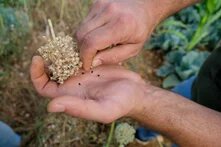As soil and water in Tunisia reach their limits, agroecology emerges as the most robust pathway leading out of the failing system. To succeed, it must leverage a mechanism already embedded in Tunisia's history: community-based economy.

Tunisia's agricultural sector is far more than just a major economic domain: while it accounted for 8.6 percent of GDP and 10.5 percent of national employment in 2021, it holds a central place in the collective imagination, where land ownership remains a symbol of success and family stability. It contributes significantly to food security and exports (olive oil, dates), yet remains heavily dependent on imports of cereals and oils.
However, nowadays this model, largely based on agricultural intensification supported by the massive use of chemical inputs, is reaching its limits. Soil depletion, overexploitation of aquifers—sometimes exceeding 100 percent of their capacity—and the loss of 30 percent of local varieties in twenty years illustrate a profound ecological crisis. This is compounded by a socio-economic crisis: persistent rural poverty (26 percent compared to 10 percent in urban areas, declining economic value for smallholders, limited access to credit, and a lack of tailored training and support.
A new agricultural and rural paradigm is no longer an option but a national urgency.
In this context of growing vulnerability, the transition to a new agricultural and rural paradigm is no longer an option but a national urgency. Faced with the failure of a productivist model that has weakened ecosystems and deepened social inequalities, agroecology, grounded in its 13 systemic principles, emerges as the most robust pathway leading out of the failing system. To succeed, it must leverage a mechanism already embedded in Tunisia's history: community-based economy (CBE). Rooted in ancestral solidarity practices and embodied today by Agricultural Development Groups (GDA), Mutual Agricultural Service Societies (SMSA), cooperatives, social and solidarity economy (SSE) entities, and community enterprises, they offer the ideal foundation for building an inclusive, resilient transition aligned with national objectives (Nationally Determined Contributions, Low-Carbon Strategy, National Ecological Transition Strategy).
This article demonstrates why and how the synergy between agroecology and community-based economy (CBE) can become the cornerstone of a sustainable rural future in Tunisia. It proposes a roadmap structured around four strategic levers to translate this vision into concrete actions and grant CBE approaches the central role they deserve.
Agroecology Is A Systemic Response Aligned with National Ambitions
Agroecology is a holistic approach that integrates ecological, social, and economic dimensions. Guided by the 13 principles of the FAO’s High Level Panel of Experts on Food Security and Nutrition, it promotes diversified practices like polyculture and agroforestry to enhance resilience, circular flows such as composting to reduce external inputs, co-creation of knowledge between farmers and experts, and participatory governance to ensure social justice and fair resource distribution.
The Tunisian state is gradually integrating agroecology, but action remains limited and technocratic. In 2025, the Agricultural Investment Promotion agency (AIPA) launched the “Soil Matters” program with the EU and GIZ to support innovative startups in digitalization and sustainable soil management. The International Fund for Agricultural Development (IFAD) emphasizes the central role of Tunisian agriculture and calls for inclusive value chains, while reaffirming its partnership with the state on sustainability, climate, and social inclusion. However, public investments still favor agribusiness and sectors dominated by large companies, while the legal framework remains unsuitable for community-based economy (CBE). Tunisian civil society denounces the lack of a coherent strategy, support for conventional inputs, and insufficient safety nets for smallholders. Nonetheless, the agroecological transition remains a strategic opportunity, aligned with national commitments (National Determined Contribution, Low-Carbon Strategy, Ecological Transition) and strengthened by local initiatives that restore soils and generate environmental value.
Community-Based Economy Models Are The Fertile Ground for Transition
Defined as "forms of economic organization that place the community and the satisfaction of its needs at the center, through collective management, common ownership, or democratic governance", Community Based Economy (CBE) are the natural foundation of agroecology.
Tunisia possesses a rich heritage of collective structures.
Tunisia possesses a rich heritage of collective structures: cooperatives, Agricultural Development Groups (GDA), mutual service societies, associations, and Social and Solidarity Economy (SSE) entities, which embody principles of sustainability, ecological sobriety, and social cohesion. This ecosystem, rooted in centuries-old traditions of solidarity, has been formalised through successive laws. Today, there are nearly 316 Mutual Agricultural Service Societies (SMSA) and approximately 3,000 Agricultural Development Groups (GDA), playing a vital economic and social role in managing irrigation, pooling costs, and creating non-relocatable rural jobs.
Although still marginalised compared to industrial agriculture, these structures act as powerful levers by combining economic, social, and environmental benefits: they enable the pooling of production resources, the valorisation of local wellness, and the development of short supply chains; they foster strong inclusion—particularly for women and youth—while creating jobs, strengthening social cohesion, and advancing local food sovereignty; and they promote the sustainable, collective management of common resources such as water, pastures, and forests, alongside the adoption of agroecological practices.
Systemic Barriers Constrain Potential
Despite their theoretical advantages, community-based economy (CBE) approaches struggle to take root in practice due to major structural barriers. The legal framework is fragmented and poorly adapted, with each CBE type governed by a different regime—the Cooperative Law of 1967, the Agricultural Development Groups (GDA) status of 1999, and the Social and Solidarity Economy (SSE) Law of 2020—creating legal uncertainty, while the Social and Solidarity Economy (SSE) Law remains largely ineffective without implementing decrees.
Access to funding and technical support is also limited, as financial institutions favour individual, short-term models, leaving CBE models with weak equity and public subsidies that rarely match their need for patient capital and long-term accompaniment. This is compounded by institutional isolation and the absence of a coherent political vision, as agricultural institutions lack clear policies to promote CBE approaches, their integration into local development and climate strategies remains marginal, and dialogue with the state is often tenuous.
Strategic Recommendations: Four Levers for Systemic Transformation
To make community-based economy (CBE) models legitimate pillars of the agroecological transition, Tunisia needs a voluntarist, coherent, and coordinated national strategy. This should be articulated around four complementary levers.
- Strengthen Governance and the Legal Framework
- Adopt a unified framework law for CBE and publish the implementing decrees for the 2020 Social and Solidarity Economy (SSE) Law.
- Create multi-stakeholder territorial support points bringing together the state, local authorities, civil society, and farmers' federations to support CBE. - Funding and Capacity Building
- Create a national "Agroecology & Territories" fund with state and donor support.
- Channel climate finance (Green Climate Fund, Adaptation Fund) towards projects led by CBE.
- Develop solidarity microfinance and offer technical training adapted to agroecology. - Territorial Anchoring and Market Access- Integrate Community-Based Economy (CBE) into Regional Development Plans
- Support short and labelled "agroecology" supply chains (short circuits, local markets, public procurement).
- Facilitate access to productive resources (land, water) for collectives. - Awareness, Research, and Citizen Participation
- Integrate agroecology and Social and Solidarity Economy (SSE) into school and university curricula.
- Showcase local successes through media and public campaigns.
- Involve consumers through solidarity basket schemes and Community-Supported Agriculture (CSA).
Tunisia already boasts numerous successful initiatives, such as women's cooperatives for aromatic plants in the northwest or agropastoral groups regenerating rangelands in the arid south. These experiences often remain isolated, and their scaling requires exchange networks, mentorship programs, integration into training and research, and adapted financial mechanisms. Therefore, the four levers listed above should be complemented by a cross-cutting axis which is scaling up local experiences. By capitalising on this vibrant fabric, Tunisia can accelerate its agroecological transition while respecting the diversity of its territories and communities.
Conclusion: Tunisia Is in the Need for Urgent and Systemic Transformation
Implementation requires strong political will.
Tunisia faces a convergence of food, climate, economic, and social crises that demands an immediate transformational response. The agroecological transition, driven by community-based economy (CBE) models, is the most robust pathway for a resilient, just, and sustainable rural future and is a necessity for food security, resource preservation, and social cohesion. Its implementation requires strong political will, intersectoral coordination, and targeted financial mobilisation of national resources and climate funds.
The time for isolated pilot projects is over: Tunisia possesses local knowledge, a diversity of territories, and a dynamic civil society to succeed in this transition, which extends beyond the agricultural sector and constitutes a genuine societal project for future generations. Succeeding in this transformation means strengthening food sovereignty, enhancing territories, and guaranteeing an inclusive and sustainable development model. Every actor—state, local authorities, civil society, and producers—has a key role to play in building a prosperous and resilient rural future together.

